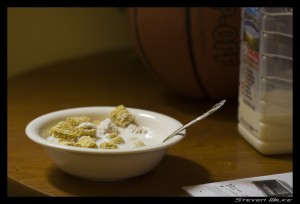 It is incredibly important to limit the sugar that is in any child’s diet, but it is of particular importance for the boy or girl who struggles with childhood anxiety or depression. Many parent’s have found that after evaluating their child’s diet and then making a few changes, that their child’s anxiety was greatly reduced. Unfortunately, it isn’t as easy as saying no to ice-cream and candy bars. Sugar, in some form, is in almost everything that occupies the shelves of a grocery store. Even items that are marketed as being relatively healthy (such as granola bars, flavored yogurt, children’s cereal, or fruit snacks) are filled with sugar. Did you know that a standard serving of flavored yogurt has approximately 27 grams of sugar?
It is incredibly important to limit the sugar that is in any child’s diet, but it is of particular importance for the boy or girl who struggles with childhood anxiety or depression. Many parent’s have found that after evaluating their child’s diet and then making a few changes, that their child’s anxiety was greatly reduced. Unfortunately, it isn’t as easy as saying no to ice-cream and candy bars. Sugar, in some form, is in almost everything that occupies the shelves of a grocery store. Even items that are marketed as being relatively healthy (such as granola bars, flavored yogurt, children’s cereal, or fruit snacks) are filled with sugar. Did you know that a standard serving of flavored yogurt has approximately 27 grams of sugar?
Alternate Names for Sugar
Sugar is not always listed as “sugar” on ingredient labels. So, what common names is sugar masquerading under? Let’s take a look: barley malt, beet sugar, brown sugar, buttered syrup, cane juice crystals, cane sugar, caramel, corn syrup, corn syrup solids, confectioner’s sugar, carob syrup, castor sugar, cate sugar, demerara sugar, dextran, dextrose, diastatic malt, diatase, ethyl maltol, fructose, fruit juice, fruit juice concentrate, galactose, glucose, glucose solids, golden sugar, golden syrup, grape sugar, high-fructose corn syrup, honey, icing sugar, invert sugar, lactose, maltodextrin, maltose, malt syrup, maple syrup, molasses, muscovado sugar, panocha, raw sugar, refiner’s syrup, rice syrup, sorbitol, sorghum syrup, sucrose, sugar, treacle, turbinado sugar, yellow sugar. Wow! That is quite a list.
Sugar and Anxiety
You might be thinking, “okay this is all great, but what exactly does it have to do with childhood anxiety?”. When sugar is consumed on a regular basis, it causes the brain to constantly anticipate and expect the elevated endorphin levels that are produced due to an increase in the body’s production of insulin. After some time, the body compensates by cutting back on the production of endorphins. When this happens, depression, anxiety, and/or mood swings can be the result. In order for someone to feel better, they must produce extra endorphins by consuming more sugar. This often elevates a person’s mood for a short while, but the effects are short lived. Soon a viscous cycle has been created, and the body’s ability to regulate emotions has been compromised. The brain then remains on alert and anxiety is often the result.
Avoiding Sugar
One of the most important things that you can do to positively impact your family’s health, is to get into the habit of reading labels and second guessing marketing tactics. Just because something is marketed as “healthy” or “natural” does not mean that it is good for anyone. One of the easiest ways to avoid an overabundance of sugar, is by limiting your reliance on processed food and aiming to eat and serve whole foods as much as possible. Of course, not all sugar is created equal. Although an apple and a candy bar may technically have the same sugar content, one obviously provides the body with essential nutrients, and therefor contributes to your overall well-being. The optimal anti-anxiety diet is one that is high in protein and consists of a variety of foods that are as close to their natural state as possible.





